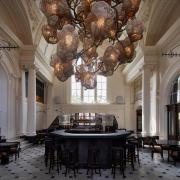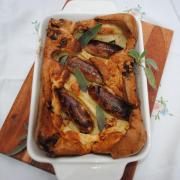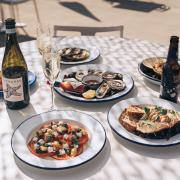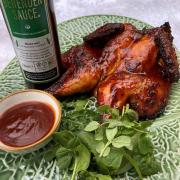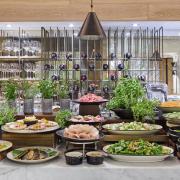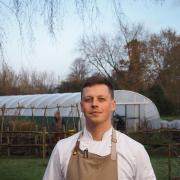The largest collection of temperate fruit in the world is in Faversham, Kent.
Kent has 15 cider producers who produce 450,000 litres collectively, the smaller producers making their cider from 100 per cent locally sourced Kent apples, fermented over a three to six-month period to produce a drink very different to the fizzy commercial ciders that once were the norm.
Here in the Garden of England we are lucky enough to have The National Fruit Collection, based at Faversham’s Brogdale Farm, which gives visitors an opportunity to taste the apple varieties Henry VIII would have eaten, the nuts Columbus would have carried to America, and the varieties of plum the Victorians loved so much.
With nearly 4,000 varieties of fruit on one site, once you’ve tasted the bounty at Brogdale straight from the tree, you’ll never settle for the bland supermarket offerings again.
I visited in mid-July, a bit early for most of the apples but a perfect chance to gorge on super-ripe cherries off the branch as I joined a tour group. There’s so much to learn here and numerous festivals throughout the year help celebrate the different fruits as they each come into their own.
This month, it’s the turn of the Cider Festival (25-26 September), when there will be the chance to taste and take home lots of different varieties of cider from around the UK and Kent in particular. A hog roast will help soak it all up and entertainment ranges from live local music to pig racing and rides on the Brogdale miniature steam railway.
As well as orchard tours on foot or by tractor trailer, there are also talks on cider making and gardening-related topics, with guides on hand to tell you about fruit identification and growing fruit at home. Kent producer Rough Old Wife is now offering cider-making courses at Brogdale and its drinks will be showcased at the cider festival, along with those of many other local suppliers.
As well as the festival, you can also visit the Marketplace, which was created here in 2007 when a �1m refurbishment took place and offers everything from holistic practices to an award-winning butcher and Grow, whose experts manage the propagation of heritage varieties for the public and orchards as well as run the onsite nursery and garden centre.
Brogdale Collections’ business manager, Sally Roger, enthuses: “We’re having a great year! It’s very in vogue to be watching one’s carbon footprint and buying local produce and people realise fruit tastes great when it’s picked at its ripest and eaten seasonally and hasn’t travelled miles to get there.
“We’re trying to attract visitors
who might think we’re a bit highbrow and scientific. Yes, we are the National Fruit Collection and we
are an important genetic source, but we are also about families appreciating the seasons and having time out together in the fresh air.”
Sally adds: “We have more than 2,200 varieties of apple but at the Cider Festival we’ll offer around 200, including some really unusual ones like the ugly Knobby Russett – I love that apple, it’s really odd looking, but
it tastes but absolutely delicious!”
Getting distinctly peckish now, it was time to join Mike Austen, who has worked as a tour guide one day a week since 1992. A former fruit and arable farmer, he and his wife have lived in Faversham all their lives.
“It’s a lovely little job to do in my retirement,” he tells me as he leads
our small party expertly around the fields – walking backwards while he talks so we don’t miss a single word.
“We’ve got the biggest Collection
in the world here and our main aim is conservation. We have to have a living tree, not a seed bank, to keep the
trees going and then each collection
is re-propagated approximately every
30 years by grafting or budding.
“In all the collections there are just two trees of every variety, a safety valve in case one looks a bit sick then they can propagate from the other one.”
Mike, whose own favourite apples
are Red Windsor, Claygate Pearmain
and Pinova, explains why the site is
so ideal: “It’s quite a warm little corner and we’re in the heart of the Kent fruit growing country with a good maritime climate. Our soil has a high clay content, which is very fertile, and a chalk underbase, so it drains really well.”
Nevertheless, being near the sea can bring cold north-easterly winds, which is why you’ll see 20ft windbreaks of Alder, Leylandii, Poplar and Willow, which protect 200ft into the orchard, filtering the wind rather than stopping it and helping raise the temperature
by a valuable three degrees.
Brogdale Farm is 150 acres in total and the Collections cover 55 acres,
with just two men to carry out the general maintenance, pruning, spraying and cutting the grass. Fruit picking is mainly done by foreign students.
The cider collection consists of four types of cider apple: sharps and bitter sharps and sweets and bittersweet.
“Cider has been a very important drink from the Norman Conquest –
at one time the main fruit growers were the monasteries and about 96
per cent of the apples were made
into cider because it was much safer
to drink than the water,” Mike says.
“Up until the 1920s in Kent and Somerset, part of a farm labourer’s wage would be paid in cider and
at harvest time the daily
allowance was half a gallon.”
Apple trees are surprisingly quick
to establish, too: from planting a maiden tree you get your first fruits
in the third year and you’ll be in full production by the seventh. Definitely time to get home and start planning
a mini orchard…
Brogdale fact file• The National Fruit Collection at Brogdale is owned by the Department for the Environment, Food and Rural Affairs (Defra)• The National Fruit Collection is part of an international programme to ensure that there are food crops for the future in the context of climate and environmental change• Brogdale Collections is a charity founded in April 2007 to promote and encourage the long-term sustainable future of the National Fruit Collection as a Living Collection at Brogdale Farm• Hillread Land is the owner of the Brogdale Farm site and has invested more than �1m since April 2007 to renovate the existing buildings and create a Marketplace of shops selling local produce• The University of Reading was appointed curator of the National Fruit Collection in 2007 by Defra following a competitive tender• The Farm Advisory Services Team (FAST) are the horticulturalists of the Living Collection on behalf of the University of ReadingGet in touch Brogdale Farm, Brogdale Road,Faversham ME13 8XZ (M2, Junction 6)%01795 536250) enquiries@brogdalecollections.co.ukOpen: Brogdale Farm and Marketplace open seven days a week, 10am-5pm, 4 Nov-26 March, 10am-4.30pm.Guided walks: �7 adults, �6.50 concs., �3.50 children (under 16), �17.50 families. Self-guided walks: �5 adults, �4.50 concs., �2.50 children (under 16), �12.50 families. Group discountsSeason tickets: �17.50 per person or �38 family: unlimited access to all walks and all festivals for 12 months.
Brogdale fact file
• The National Fruit Collection at Brogdale is owned by the Department for the Environment, Food and Rural Affairs (Defra)• The National Fruit Collection is part of an international programme to ensure that there are food crops for the future in the context of climate and environmental change• Brogdale Collections is a charity founded in April 2007 to promote and encourage the long-term sustainable future of the National Fruit Collection as a Living Collection at Brogdale Farm• Hillread Land is the owner of the Brogdale Farm site and has invested more than �1m since April 2007 to renovate the existing buildings and create a Marketplace of shops selling local produce• The University of Reading was appointed curator of the National Fruit Collection in 2007 by Defra following a competitive tender• The Farm Advisory Services Team (FAST) are the horticulturalists of the Living Collection on behalf of the University of Reading
Get in touch
Brogdale Farm, Brogdale Road,Faversham ME13 8XZ
(M2, Junction 6)
(01795 536250)
enquiries@brogdalecollections.co.uk
Open: Brogdale Farm and Marketplace open seven days a week,
10am-5pm, 4 Nov-26 March, 10am-4.30pm.
Guided walks:
�7 adults,
�6.50 concs.,
�3.50 children (under 16),
�17.50 families.
Self-guided walks:
�5 adults,
�4.50 concs.,
�2.50 children (under 16),
�12.50 families.
Group discounts
Season tickets: �17.50 per person or �38 family:
unlimited access to all walks and all festivals for 12 months.
The largest living collection of temperate fruit in the world is right here in the heart of Kent in Faversham and this month you can enjoy the early apples at Brogdale Farm’s Cider Festival Words by Sarah Sturt pictures by Manu PalomequeWith a 15 per cent increase in the amount of cider consumed in the UK in the last five years and smaller artisan producers attracting a new local following, cider has emerged from its rather murky rural image to become a drink of connoisseurs.
pictures by Manu Palomeque
Words by Sarah Sturt
The largest living collection of temperate fruit in the world is right here in the heart of Kent in Faversham and this month you can enjoy the early apples at Brogdale Farm’s Cider Festival.
With a 15 per cent increase in the amount of cider consumed in the UK in the last five years and smaller artisan producers attracting a new local following, cider has emerged from its rather murky rural image to become a drink of connoisseurs.



